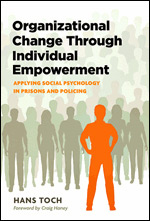Organizational Change through Individual Empowerment: Applying Social Psychology in Prisons and Policing

Author: Hans Toch
Publisher: Washington, DC: American Psychological Association, 2014. 186p.
Reviewer: Russ Immarigeon | September 2015
Hans Toch, past president of the American Association of Correctional Psychologists and recipient of the prestigious Research Award of the International Corrections and Prison association, is distinguished professor emeritus at the State University of New York in Albany, where he has long taught at its School of Criminal Justice. In his career, Professor Toch has written or edited approximately 20 books and many more articles on criminal psychology, violent offenders, violent prisoners, solitary confinement, maladaptive prisoner behavior, the ecology of surviving in prison, prison suicides, and therapeutic correctional interventions. He has also written extensively about policing, police violence, and human service interventions. His articles have appeared in research journals, such as the Journal on Research in Crime & Delinquency, and in practice-oriented publications, such as Federal Probation.
In Organizational Change through Individual Empowerment, Toch offers a series of reflective essays that serve as short overviews of various aspects of his research work in legal psychology, human services, policing, and, more voluminously, corrections. In particular, separate chapters focus on his prison-based work on group dynamics, crisis interventions, inmate self-government, suicide prevention aides, conflict de-escalation, difficult prisoners, and high-security prisons. These conversational reports on his practice are engagingly written, interesting, and insightful, far afield of much academic prose.
In 1961, Toch’s first book, Legal and Criminal Psychology, established social psychology’s place within criminal justice and corrections. Throughout his correctional work, Toch argues that prisons have an obligation to support, encourage, and enforce the human development of the men and women confined within them. Social psychology, for him, requires treating human beings as human beings. He writes of the pointlessness of simply doing time, the absence of any opportunity for self-improvement or experiential progression, a perspective that serves as the foundation for many current examinations of how we respond to mentally ill persons, substance-abusing men and women, and even violent offenders who pass through local, state and federal jails and prisons.
In an admiring foreword to this volume, University of California, Santa Cruz psychologist Craig Haney sums up some of Toch’s career accomplishments:
- Exploring the ways that preexisting “perceptual readiness” may lead persons to over-perceive violence in their social and professional interactions;
- Struggling to improve the life chances of persons coming out of prison by creating “new careers” in which they are trained and employed to provide meaningful rehabilitative services to their peers;
- Developing a radical approach to the prevention of police violence by introducing “action review panels” that assembled groups of respected officers to critically review the behavioral patterns of their colleagues, analyze their motivations, and lead them through a process of increasing self-awareness and eventual restraint;
- Implementing the use of “crisis teams” in prisons where corrections officers partnered with mental health staff to jointly and systematically analyze prisoner distress and propose more humane interventions;
- Championing what nowadays would be described as a truly “radical” experiment to democratize prison governance by giving prisoners much larger roles in day-to-day prison decision making, premised on the notion that if they were treated with respect, as responsible adults capable of good and even altruistic behavior inside prison, they would retain this self-image and these behavior patterns after they were released;
- Devising a model of comprehensive “sentence planning” in which long-term prisoners worked closely with prison officials over the course of their extended prison sentence to receive continuous training and opportunities for development that maximized their chances to establish genuine, substantial, and sustaining “careers” once released; and
- Helping to intellectually “if not yet physically” deconstruct the logic of the most stultifying and severe solitary confinement units, where the most troubled and troubling prisoners are placed to have their already “rock-bottom, hardscrabble existence made even more rock-bottom and hardscrabble” in a misguide effort to “motivate” them to change somehow for the better.
Toch explores each of these accomplishments, and a few others, in this volume’s dozen chapters, each of which reflect upon specific research endeavors Toch has pursued over the years. These reflections cover professional associations he has made, lessons he has learned, and methods he has pursued. Among Toch’s best known prison- and prisoner-related books are Violent Men (1992), Living in Prison (1992), Mosaic of Despair (1992), The Disturbed Violent Offender (1994), Corrections: A Humanistic Approach (1997), and Acting Out (2002).
Toch concludes, “It is ironic that psychology as a discipline could ever be invoked to justify the enactment of deprivations or the effort to withhold responses to basic human needs and aspirations.” He notes contemporary shortcomings: “the technology that is nowadays at issue in cognitive-behavioral interventions may in fact be ‘cognitive,’ as advertised, but the cognition that is involved appears to be that of the staff of psychologists and not that of the prisoners who complete homework assignments and whose contributions to the process are circumscribed and regimented.”
He adds that “the number of psychologists who appear willing to entertain a diminished conception of human nature increases when the human nature at issue is that of prisoners, of offenders, or of offending prisoners.” Finally, as he observes with conviction, “If there is one thing that we have learned as psychologists about inducing meaningful change – change that takes hold and has an impact we expect to endure – it is that the people we want to change have to actively participate in the process and have to internalize its goals. Your aspiring change agent (such as your psychologist in the prison segregation unit) may have definitive ideas about the improvements he or she wishes to effect in the client, but for those improvements to occur the client must institute them – which means that he or she must buy into the scheme – or the best that change agent can expect for his or her efforts is sullen and resentful acquiescence.”
Copyright © 2014 Civic Research Institute. This review originally appeared in Corrections Managers Report (http://www.civicresearchinstitute.com/cmr.html) and is used here with permission of the publisher.
Russ Immarigeon, local “town and village” court justice, upstate New York


